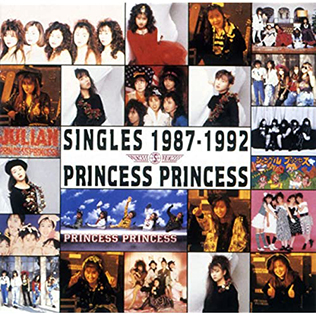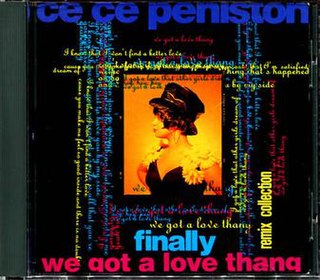Related Research Articles

Namie Amuro is a Japanese former recording artist, producer, dancer, model, actress and entrepreneur who was active between 1992 and 2018. A leading figure of the Japanese entertainment industry since the early 1990s, Amuro is known for breaking the youthful idol stereotype of J-Pop, changing the fashion trends and lifestyle of women in Japan, her experimentation across music styles, and for her visual imagery in music videos and live performances. Due to her career longevity, resilience, professionalism, efforts behind-the-scenes in the music industry, and her way of life, she is considered a pop culture icon in Japan and Asia. She has been referred to as "Diva of Heisei Era" and the "Queen of Japanese Pop", and has been recognized as having the influence and career impact domestically equivalent to artists such as Janet Jackson and Madonna in Western music and pop culture.
Toshinobu "Toshi" Kubota is a Japanese singer, songwriter, musician, music producer, and radio personality. He has produced six million-seller records and thirty-three Top 40 singles during his career. Kubota is currently part of Sony Music Japan. In addition, he has composed and written songs for many singers including Hiromi Iwasaki, Misia, Toshinori Yonekura, Kyōko Koizumi, and many other recording artists.

Greatest Hits is the eleventh official album release for English musician Elton John, and the first compilation. Released in November 1974, it spans the years 1970 to 1974, compiling ten of John's singles, with one track variation for releases in North America and for Europe and Australia. It topped the album chart in both the United States and the United Kingdom, staying at number one for ten consecutive weeks in the former nation and eleven weeks in the latter. In Canada, it was number one for 13 weeks between December 14, 1974, and March 22, 1975, missing only December 28, 1974, at number 2 to Jim Croce's Photographs & Memories.

"Tears in Heaven" is a song by English guitarist, singer, and songwriter Eric Clapton and Will Jennings, written about the death of Clapton's four-year-old son, Conor. It appeared on the 1991 Rush film soundtrack. In January 1992, Clapton performed the song in front of an audience at Bray Studios, Berkshire, England for MTV Unplugged, with the recording appearing on his Unplugged album.
Oricon Inc., established in 1999, is the holding company at the head of a Japanese corporate group that supplies statistics and information on music and the music industry in Japan and Western music. It started as Original Confidence Inc., which was founded by Sōkō Koike in November 1967 and became known for its music charts. Oricon Inc. was originally set up as a subsidiary of Original Confidence and took over the latter's Oricon record charts in April 2002.

"Wishing on the Same Star" is the second and final single by American singer-songwriter Keedy. Written by Diane Warren, the single was released in 1991 by Arista Records. It peaked at number 86 on the Billboard Hot 100; a second push was made to American pop stations in 1992, but it failed to chart. The single was released in Japan as "Itsumo Futari de".
This is the list of music recordings produced by the Japanese singer-songwriter Miyuki Nakajima. She has released 44 studio albums, 46 singles, 3 live albums, 11 live videos, and multiple compilations up to April 2022.

"Sexy Music" is a single by Irish female vocal group The Nolans, from their 1980 album Making Waves. Released exclusively in Japan by Epic Records on March 21, 1981, the single was a commercial success, selling over 270,000 copies. The song also made the Nolans the first European act to win the Grand Prix at the Tokyo Music Festival

Singles 1987–1992 is the first compilation album by the Japanese girl band Princess Princess, released on July 15, 1992, by Sony Records. The album compiles the band's singles from 1987 to 1992, including their five consecutive No. 1 hits "Diamonds", "Sekai de Ichiban Atsui Natsu", "Oh Yeah!", "Julian", and "Kiss".
Ann Lewis is a Japanese musician, popular in the 1970s and 1980s.

Finally / We Got a Love Thang: Remix Collection is the first limited remix collection by CeCe Peniston, issued exclusively in Japan in 1992. The album was compiled of the singer's first two singles, as a result of charting both in the Japanese Top 10 at the same time. The album included overall eight versions remixed by David Morales, Steve Hurley, Maurice Joshua and E-Smoove.
The Oricon Albums Chart is the Japanese music industry standard albums popularity chart issued daily, weekly, monthly and yearly by Oricon. Oricon originally published LP, CT, Cartridge and CD charts prior to the establishment of the Oricon Albums Chart on October 5, 1987. The Oricon Albums Chart's rankings are based on physical albums' sales.
The Oricon Singles Chart is the Japanese music industry-standard singles popularity chart issued daily, weekly, monthly and yearly by Oricon. Chart rankings are based on physical singles' sales. Until 2017, Oricon did not track download sales. In Japan, physical sales decreased sharply in the 2000s, while download sales hit three to four times the amount of single sales. In November 2017, Oricon introduced its first digital songs chart, separate from its main physical singles chart. On December 24, 2018, Oricon launched a streaming chart, and introduced a combined singles chart that utilizes physical single sales, downloads, and streams.

"Watashi ni Tsuite" is a song recorded by Japanese singer Shizuka Kudo. It was released as a single by Pony Canyon on September 21, 1990. The song made its first album appearance on the compilation album Unlimited, released that same year.

"Mechakucha ni Naite Shimaitai" is a song recorded by Japanese singer Shizuka Kudo, from her seventh studio album, Trinity. It was released through Pony Canyon as the album's lead single on January 29, 1992. Kudo performed the song on the 43rd Kōhaku Uta Gassen, marking her fifth consecutive appearance on the annual show. In 2007, Kudo recorded a self-cover of the song with a jazz arrangement for the compilation album Shizuka Kudo 20th Anniversary the Best, released in commemoration of her 20th anniversary.

"Mellow" is the 24th single by Japanese entertainer Miho Nakayama. Written by Nakayama and Yoshimasa Inoue, the single was released on April 1, 1992, by King Records.
References
- ↑ "1992年 邦楽ヒット曲 ランキング". nendai-ryuukou.com. Retrieved 18 August 2016.